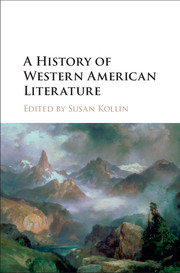Book contents
- Frontmatter
- Contents
- Notes on Contributors
- Acknowledgments
- Introduction: Historicizing the American Literary West
- PART I HOMELANDS
- PART II MAKING A REGION
- PART III GEOGRAPHIES OF THE LITERARY WEST
- 8 Literature of the Great Plains: Nature, Culture, and Community
- 9 Southwest Literary Borderlands
- 10 Imagining the Rocky Mountain Region
- 11 Writing the Pacific Northwest
- 12 The Far North: Literatures of Alaska and Canada
- 13 The Problem of the Critical in Global Wests
- PART IV THE TWENTIETH CENTURY AND BEYOND: LITERARY MOVEMENTS AND CRITICAL PERSPECTIVES
- Selected Bibliography
- Index
12 - The Far North: Literatures of Alaska and Canada
from PART III - GEOGRAPHIES OF THE LITERARY WEST
Published online by Cambridge University Press: 05 November 2015
- Frontmatter
- Contents
- Notes on Contributors
- Acknowledgments
- Introduction: Historicizing the American Literary West
- PART I HOMELANDS
- PART II MAKING A REGION
- PART III GEOGRAPHIES OF THE LITERARY WEST
- 8 Literature of the Great Plains: Nature, Culture, and Community
- 9 Southwest Literary Borderlands
- 10 Imagining the Rocky Mountain Region
- 11 Writing the Pacific Northwest
- 12 The Far North: Literatures of Alaska and Canada
- 13 The Problem of the Critical in Global Wests
- PART IV THE TWENTIETH CENTURY AND BEYOND: LITERARY MOVEMENTS AND CRITICAL PERSPECTIVES
- Selected Bibliography
- Index
Summary
At the age of forty, after a twenty-five year absence, I returned to my home in Alaska. Not long after, I joined an Alaska Native cast entertaining visitors in a summer theater. The old stories we performed reminded me of my Tlingit grandmother's lessons delivered in a loving, scolding voice so many years before. At the theater, I took my turn drumming, narrating, and acting out the accounts of our history, including the story of “The Woman Who Married a Bear.”
In the final act, the woman realizes that even though she has witnessed the death of her bear-husband, removed the bearskin from her back, and returned to her village, she can no longer be fully human. Onstage, I circled the skin in the air behind my body, where it fell on my shoulders and transformed me. I walked in the slow manner of a bear, bending to place one leg deliberately forward, then one arm, then the next and the next in confident steps. After a few moments, I raised up in a shudder, moving my hide-covered head back and forth as though smelling the air, and dropped heavily back to the floor, swaying and raising my shoulders into a telltale brown bear hump. In that moment, the woman and I both became the bear.
Within the genre of interspecies marriage, stories of men and women who marry bears commonly appear in oral traditions of Arctic and Subarctic cultures and have been transferred to written accounts, in both the original languages for which writing systems have been developed and the English language. Generally, stories of human-ursus intimate interaction begin with the bear presenting itself to the human, often in response to violation of a cultural behavior code, for example, the utterance of an insult that, like all spoken words, can be heard by the distant bear. This testament to the power of spoken words is illustrated in the groundbreaking classic Haa Shuká, Our Ancestors, a comprehensive collection of oral narratives edited by the Tlingit poet and scholar Nora Marks Dauenhauer and her husband, Richard Dauenhauer. In this work, oral histories are written in Tlingit and in English on facing pages. The story is told of a young woman who utters an insult that sets the literary drama in motion.
- Type
- Chapter
- Information
- A History of Western American Literature , pp. 192 - 204Publisher: Cambridge University PressPrint publication year: 2015



